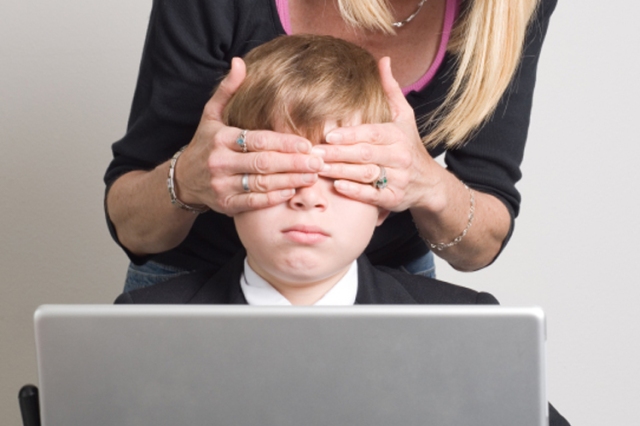by: Fabricante, Aleah

“More Sex , More Violence , More Troubled Kids”
According to a newly released study by the Parents Television Council (PTC) that prime time network television is more violent than ever before. Not only that, but the violence increasingly is of a sexual nature.
Among the most sexually violent shows are those in the C.S.I. franchise on CBS. According to Nielsen Media Research, on average more than a million children tune in to C.S.I. every week.
The PTC found that portrayals of violence are up 75 percent since 1998. And the violence portrayed is now a fundamental part of storylines, whereas in 1998 violence was incidental to plots. The study also found that violence is depicted more graphically than ever before.
Producers and programmers are filling the airwaves with violence and millions of children are watching it. And it is a very real public health issue. Why? Because thousands of studies indicate that exposure to violence on television is directly correlated to an increase in violent behavior and aggression in children. This is accepted fact in the social science community. Textbooks on human development now dedicate pages to the effect television viewing has on the development of children.

The PTC’s study includes an expert commentary by Deborah A. Fisher, Ph.D., from the Pacific Institute for Research and Evaluation. Fisher states that children, on average, will be exposed to a thousand murders, rapes, and assaults per year thanks to television. She warns that early exposure to television violence has “consistently emerged as a significant predictor of later aggression.” Fisher also describes other effects that viewing televised violence has on children: increased fear, anxiety, obsessive thoughts and sleep disturbances.
Perhaps most troubling, because of its societal implications, is the finding that viewing violence desensitizes children to violence in real life. They become less sympathetic to the victims of violence and less willing to intervene to stop violence.
So the entertainment media bombard children with violent images, yet we’re still astounded when kids kill kids in schools, on playgrounds, at the mall. Is it any wonder schools are now forced to have anti-bullying curricula? Let’s put two and two together. Violence in the name of entertainment is a major problem, especially for the youngest and most vulnerable members of our society.
Keep in mind, all the blame can’t be heaped on Hollywood. After all, ratings for these violent programs are often quite high. C.S.I. consistently ranks among the ten most popular programs week after week. More than a million children – week after week – watch it. And absorb the violence. All with their parents’ approval.
According to Fischer, the combined results of hundreds of studies show that up to 10 percent of real-life violence may be attributed to media violence.
Thank God the remote has an “off” switch! Parents should use it more often.\
source: http://www.mrc.org/articles/more-violence-more-sex-more-troubled-kids
Sex and violence are common occurences in the media and with the available exposure kids have to media, their behavior, perceptions and personalities can be easily influenced and distorted.

What media is reaching my children?
In today’s society, the average child watches four hours of television every day; listens to music between 4 and 5 hours; and plays video games up to 7 hours a week.
Television watching is a favorite activity for kids; however, T.V. alone is estimated to be responsible for motivating at least 10% of youth violence. Although some stations contain ratings for shows, it is important to keep in mind they are not always age appropriate.
Violent video games are the most heavily marketed and consumed games. Exposure to violent video games is has shown to increase levels of aggression in both young adults and children.
Music today sometimes contains very explicit lyrics that often reference sex, drugs, alcohol, and violence. Heavy metal and rap music are known to glorify violence and some artists have been charged with violent crimes in real life, which can distort children’s views of the real consequences that follow certain behavior.
What are the dangers of exposure to sex and violence in the media??
Younger children tend to model behavior they see and don’t always understand the difference between reality and entertainment; therefore, exposure to sex and violence through the media’s influence can:
Cause aggressive or anti-social behavior. Media can promote aggressive behavior and can also influence children to believe violence is a good solution to solve problems. Create a false sense of reality. Young children can’t always discriminate between real life situations and behaviors and surreal television examples. Encourage irresponsible sexual activity. Kids exposed to sex on TV are almost twice as likely to initiate sexual intercourse. Cause a child to perceive the world as more dangerous and have a darker view about the world.Desensitize and cause a lack of empathy for human suffering.Distort expectations of conflict resolution, race and male-female relationships.
What can you do to help protect you child from the negative effects of the media?
Media is everywhere but there are ways to help protect your children from the harmful effects:
- Monitor what your child is watching.
- Set limits on their exposure to TV, radio and video games.
- Talk with your child about what they see and hear. It might be awkward but if you don’t talk to them, the media may be their only other source of information.
- Help them develop realistic perceptions of the roles sex and violence have in society.
- Encourage activities OTHER than watching TV or playing video games that allow them practice pro-social behavior.
source: https://www.scanva.org/support-for-parents/parent-resource-center-2/sex-and-violence-in-the-media/
THE RISK OF ONLINE DATING
Media is one of the most effective ways of communicating and reflecting social norms. Unfortunately, when it comes to sexual violence, mainstream media is guilty of promoting ideas and behaviours that sustain a rape-prone culture. Whether it’s confusing violence with passion, seeing women purely as sex objects, or suggesting that sex drive is an out-of-control animal force, TV shows and movies consistently excuse and justify sexual violence.
Furthermore, sexual violence is often treated with humour in the media. Imagine how isolating it is for survivors to see traumatic experiences similar to their own as a punchline for a joke. By approaching sexual violence with such a light attitude, media implies that the issue is not one that deserves respect or attention.
The potential dangers of online dating have come into sharp focus following the case of Jason Lawrence, who raped five women and attacked two more after meeting them on Match.com.

The 50-year-old, who contacted thousands of women on the website, including his victims, was jailed for life over the attacks
Jurors in the case heard Match.com had failed to remove the attacker’s profile despite four complaints, leading the judge to call on dating apps to increase security.
But despite the potential risks, two experts in the field say there is no need to shy away from online dating as long as precautions are taken.
Nick Tsinonis, co-founder of Scamalytics, which creates software designed to prevent scammers from targeting people on online dating sites, offered a range of advice as to how to stay safe while interacting with a prospective date online.
1) Keep chats restricted to the website or app
“It’s really important to keep all dialogue restricted to the messaging services on the website. If you keep conversations strictly on the site scammers are unlikely to target you, because they know the dating site will detect their behaviour.”
2) Block anyone suspicious
“On the dating site users’ behavior can be monitored, so if someone becomes abusive or inappropriate, the site can respond accordingly. You also have the ability to block someone on a dating site messaging system.”
3) Take time to get to know someone before meeting
“When you meet someone you can quickly feel like you know them really well, because it’s often easier to connect in writing and to read more into the written word than the spoken word. This can mean you rush into things, and relationships may move quicker than you expect.
“Always bear in mind that the other person is a stranger. Take your time to really get to know someone, and ensure he or she is who they say they are.”
4) Ask a friend for advice and their opinion
“If you even get a gut feeling that something is not quite right, ask a friend for advice and their opinion. Sometimes our mind can trick us into thinking we’ve met the perfect match when in fact we are being conned by a scam-artist.”
5) Research them online
“Don’t be afraid to research someone you meet online. Use Google Images to check whether the photos they are using belong to someone else and check social media sites to ensure they really exist. You can also search for sentences and phrases online, in case they are using a known fake profile. If something doesn’t feel right, don’t be afraid to just stop talking to someone.”
Charly Lester, an online dating expert and founder of The Dating Awards, offers tips on how to take caution when meeting a date in person.
6) Always meet in a public place
“Anyone you meet online is a stranger, and you need to remember that, even if you’re on a second or third date.”
7) Communicate with a friend
“Let someone else know where you are, and check back in with that person at the end of the date.”
8) Avoid drinking too much on a first date.
“While Dutch courage can be enticing, you don’t want to lower your inhibitions, and end up doing something you regret.”
9) Don’t go home with them on your first date
“Even if you’re getting on really well with your date, don’t go home with him or her on the first night. And remember that bringing someone home is no safer than going to someone else’s house. You’re still inviting a stranger into your home.”
10) Don’t be afraid to just get up and leave
“Online dating can be a great way to meet people you would never had chance to meet otherwise, but there are nasty people in the world, and online dating is just one of many ways you may come across those nasty people.
“Always keep your wits about you, and if you ever feel uncomfortable you should simply leave. Your safety is of paramount importance.”







